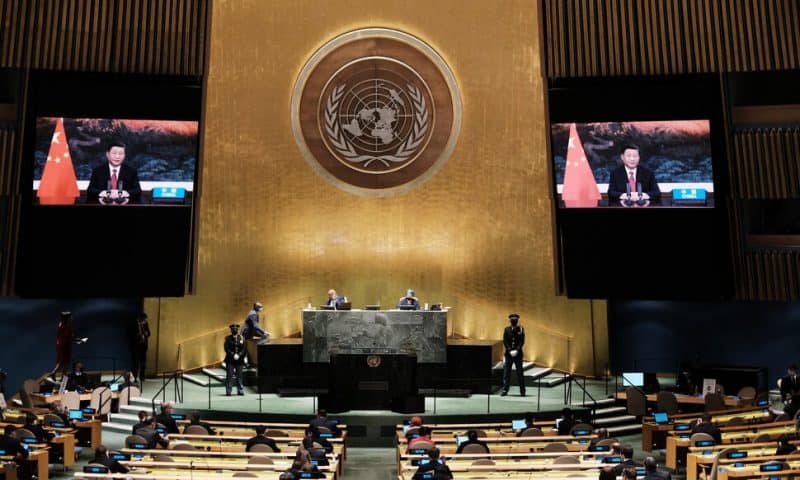Neither leader directly mentioned the other in their remarks at the U.N. General Assembly, though some references were unmistakable.
Neither President Joe Biden nor Chinese President Xi Jinping referenced one another’s country directly in high-profile remarks at the U.N. General Assembly on Tuesday, an apparent indication of both leaders’ desire to find areas of cooperation but also of the U.S. administration’s eagerness to shift its foreign policies away from the catastrophes that have dogged it so far.
To be sure, the leaders of the two superpowers made unmistakable references to the other in formal remarks at the high-profile gathering. Biden in his 30-minute in-person speech stated he had no interest in commencing a new cold war and expressed eagerness for the U.S. to return to supporting international institutions that prevent conflict, a clear acknowledgement to U.N. Secretary-General Antonio Guterres condemnation the day before of Washington and Beijing’s “completely dysfunctional relationship.”
“All the major powers of the world have a duty, in my view, to carefully manage their relationships, so we do not tip from responsible competition into conflict,” Biden said. “The U.S. is ready to work with any nation that steps up and pursues a peaceful resolution to shared challenges, even if we have intense disagreements in other areas.”
Biden spoke with Xi two weeks ago by phone, after which Chinese state media extolled its leader as having gained the upper hand over the American president.
Xi, who did not travel to New York, spent most of his roughly 15-minute taped remarks at the end of the debate session Tuesday discussing the ways in which China has supported foreign countries financially and other forms of aid to combat the ravaging effects of the coronavirus, which likely originated in China. Chinese leaders in previous international forums have also avoided referencing the U.S. by name.
Though not criticizing the U.S. directly on Tuesday, however, Xi issued clear barbs regarding some of Biden’s most recent decisions, chiefly the chaotic withdrawal from Afghanistan.
“Military intervention from the outside and so-called democratic transformation entail nothing but harm,” Xi said, in between usual platitudes endorsing new forms of international relations based on mutual respect, equity and justice.
Indeed, unlike previous presidents – chiefly Biden’s predecessor Donald Trump – the current commander in chief not only avoided referencing China but softened his tone on subjects that directly apply to it.
Biden referenced the Quad, for example, America’s loose partnership with India, Japan and Australia that can only be defined as an attempt to rally regional powers against Chinese expansionism. However, when he boasted Tuesday of U.S. attempts that began under Trump to strengthen it, Biden said only that the partnership would “take on challenges ranging from health security to climate to emerging technologies.”
An inability to strengthen the Quad, and perhaps further militarize it, likely prompted the U.S. decision to enter into a new security arrangement with Australia and the U.K. announced last week, dubbed AUKUS.
When asked about the conspicuous omission from his remarks, White House spokeswoman Jen Psaki explained that Biden “sees China as a country where there is great competition, but not one where we seek conflict.”
Not referencing China directly is “indicative of his objective of laying out our proactive agenda on the big issues we can work together on, including with China,” Psaki told reporters aboard Air Force One shortly Biden’s remarks to the U.N., specifying climate change and terrorism threats.
Some of Biden’s most vociferous critics picked up on the omission.
“Pathetically weak,” Sen. Tom Cotton, Arkansas Republican, wrote on Twitter in response to Psaki’s explanation.
Some in more friendly quarters, however, endorsed the vision for American foreign policy Biden laid out on Tuesday.
“We need to understand that most of the pressing challenges to global security – Chinese economic expansionism, Russian propaganda, and climate change, for instance – have no conventional military solutions,” Sen. Chris Murphy, Connecticut Democrat, said in a statement. “Joe Biden understands this, and his speech today was an important platform for the President to explain how America is now well-positioned to engage in the fights that really matter.”

